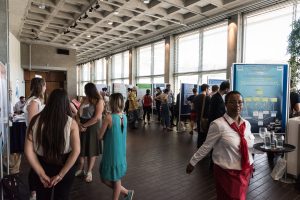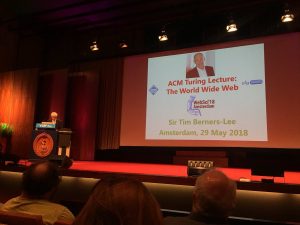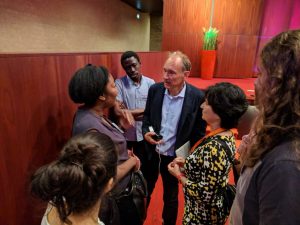Serendipity, Calamity, Inclusivity and the Future of the Web: Thoughts on the Web Science Conference 2018
PhD Symposium
On an extraordinarily sunny Sunday (at least as judged by locals!), we started with the PhD Symposium session, composed of 10- 15-minute lectures with Q&A. Students presented their PhD projects – results, ongoing work and plans. The diversity of topics was astonishing and a good insight into the interdisciplinary nature of the conference – although probably it is hardly surprising for someone accustomed with Web Science on a daily basis. We were looking at projects ranging from investigating students’ perspective on the usage of technology in education, via looking at entrepreneurship in Trinidad and Tobago, to the creation of a voice weather information system for rural areas in Ghana.
The presenters were from each stage of the PhD process – first years, as well as ones close to finishing writing up. This exchange of experiences was inspiring, especially for those at the beginning of the process. But everyone had taken something from it – the insightful questions and comments were being voiced from the morning till late afternoon, fueled by coffee.
The Symposium is something to be recommended – the freedom of form of presentations allows the speaker to guide it towards the help he/she needs, be it verification of the PhD plan, ideas about further research, or the way the presentation of their work is structured. The interdisciplinary group enables to take a step back, look at our project from a distance – and see some unexplored roads where it could be taken!
PhD Poster Session
Following the symposium, where we discussed our projects in depth with other PhD students, the poster sessions gave us another opportunity to present our research to a wider audience, and in a more relaxed atmosphere – owing in part to the free drinks and canapés. It was a great opportunity to get a variety of feedback on our work, and look at it from different angles, depending on where our conversation partners were coming from.
 The main thing I learned though was, that it totally pays off to spend hours on a single visualisation. The first draft for my poster had a big table describing a statistical model – one of the major outputs of my work. I spent a whole weekend creating a visualisation for this model: The big arrow you can see on the photo. This was much more accessible to an audience that might not be familiar with the finer details of binary logistic
The main thing I learned though was, that it totally pays off to spend hours on a single visualisation. The first draft for my poster had a big table describing a statistical model – one of the major outputs of my work. I spent a whole weekend creating a visualisation for this model: The big arrow you can see on the photo. This was much more accessible to an audience that might not be familiar with the finer details of binary logistic  regression. In the conversations I had, I found myself skipping through the background, questions and methods of my project, and spending a lot of time talking through just what my results were and how they could be interpreted, based on this graphic. It seemed to work well both in conversation, and to draw attention!
regression. In the conversations I had, I found myself skipping through the background, questions and methods of my project, and spending a lot of time talking through just what my results were and how they could be interpreted, based on this graphic. It seemed to work well both in conversation, and to draw attention!
There was also plenty of time to talk to other presenters, and get a view of just how wide the field of Web Science can be: I learned about linked data in education, media usage in Russia, and the overlap between Google Adwords and Poetry, all in one evening!
Main Conference
Sunshine, bicycles and boats greeted the participants at this year’s Web Science Conference at the Vrije University in Amsterdam. Presentations and discussions were wide-ranging on issues  like data privacy, online recruitment by fundamentalists, the spread of misinformation online, web censorship and online political participation. Research revealed just how much we are being extensively tracked via mobile apps and the presenters on this subject won the award for best paper. This was a topic of special interest to participants in light of the EU’s recent implementation of the General Data Protection Regulation. Another best paper award winner presented on Global ISIS recruitment on the Twitter. Yes, there were two winners! It was difficult to choose a winner
like data privacy, online recruitment by fundamentalists, the spread of misinformation online, web censorship and online political participation. Research revealed just how much we are being extensively tracked via mobile apps and the presenters on this subject won the award for best paper. This was a topic of special interest to participants in light of the EU’s recent implementation of the General Data Protection Regulation. Another best paper award winner presented on Global ISIS recruitment on the Twitter. Yes, there were two winners! It was difficult to choose a winner and quality of the papers were high.
and quality of the papers were high.
Most of the presentations focused on social media usage but I think we need to explore other types of web and platforms use in the future and investigate how this intertwines with the development of Artificial Intelligence. Sir Tim Berner Lee gave a standout Turing Lecture, tracing the history of the web, its present predicament, and potential future scenarios. He warned against platform silos and asked that we continue to investigate the many unintended consequences of its use as we web scientists are called to do. He said we should all spend at least 5% of our time defending it.
At the Q&A he asked for a woman to ask a question. A welcome call for representativeness. I put my hand up but was not seen, and took a chance to tweet him my question. This then led to me speaking with him in person. I asked do we need to change how we govern, or our political processes to adapt to a world with the web and AI and if so what role should that play in any change. I know it is a difficult question, but in short, he said we should review our local processes, they do play a role and we should hold each other to account for the changes that are made.
The future of the web is uncertain as digitisation allows unprecedented speed of change. Also to date, just over 50% of the world’s populations’ data helped build the web and many that have never been online are from countries that provide the materials for the hardware to sustain it under and under harsh conditions. In light of the world’s pressing issues, web scientists must be solutions focused and guided by communities. They must and create products and services in novel and bottom up ways with an eye on addressing pressing issues which persist and threaten us all. Developing interdisciplinary, being truly inclusive, cooperative and building upon what is positive is one step in the right direction.
Photos courtesy of: Gefion Thuermer, Photography of the WebSci’18 poster session Dirk Oegema (VU Amsterdam, Faculty of Social Sciences), Fabien Gandon, INRIA, France, tweet photos from the Turing Lecture 29 May 2018, Keisha Taylor, tweet photo from the Turing Lecture 29 May 2018
